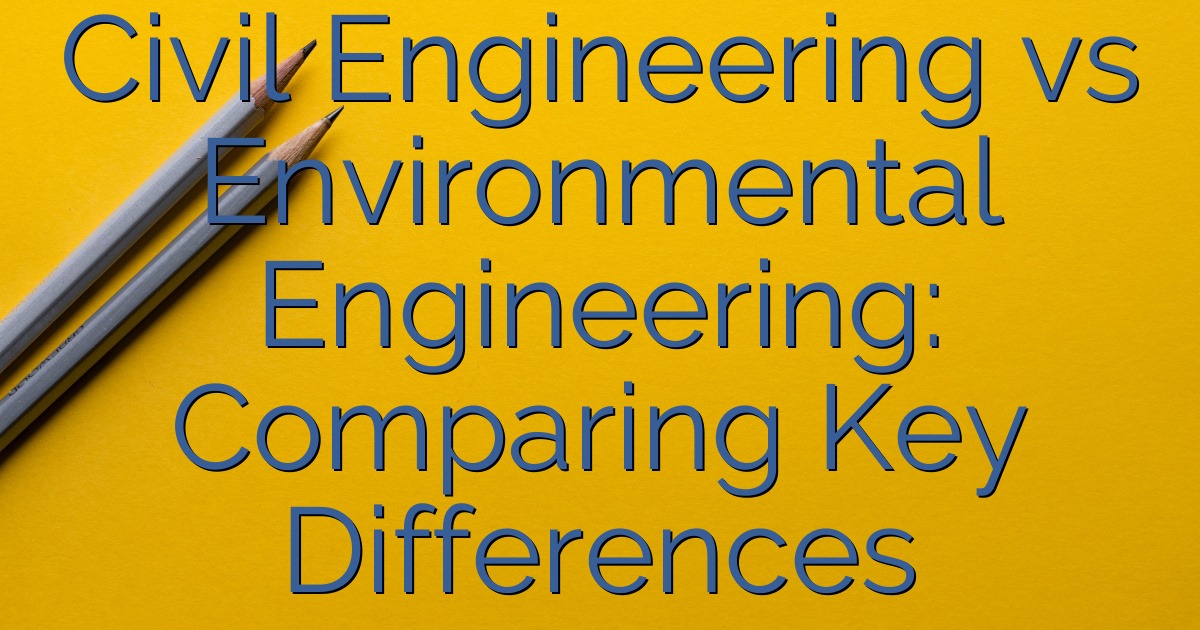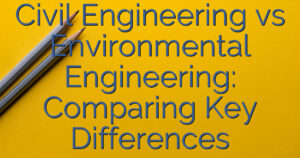
Civil engineering and environmental engineering are both disciplines within the field of engineering, although they have different areas of focus.
Civil engineering primarily deals with the design, construction, and maintenance of built environment elements such as roads, bridges, buildings, and infrastructure systems.
On the other hand, environmental engineers work to develop technology and processes to solve problems related to the natural environment, such as improving water quality or managing waste disposal.
While there is some overlap between the two disciplines, environmental engineering generally involves more chemistry and biology knowledge, while civil engineering focuses on a broader range of aspects related to construction and infrastructure development.
Both civil and environmental engineering careers can be quite rewarding and contribute significantly to the betterment of society and the environment in various ways.
When deciding between pursuing a career in civil engineering or environmental engineering, it is important to consider one’s interests, strengths, and career goals.
By understanding the key differences between these fields, students and professionals can make informed decisions about which path best aligns with their individual career aspirations.
Table of Contents
Civil Engineering
Definition and Key Concepts
Civil engineering is a branch of engineering that focuses on the planning, design, construction, and maintenance of infrastructure, such as roads, bridges, buildings, and other structures. These engineers work to ensure the safety, functionality, and sustainability of the built environment, taking into consideration factors, such as cost, materials, and environmental impact.
Areas of Specialization
Within civil engineering, there are several areas of specialization, including:
- Structural Engineering: Design and analysis of buildings, bridges, and other load-bearing structures.
- Transportation Engineering: Planning and design of transportation systems, such as highways, railways, and airports.
- Geotechnical Engineering: Analysis of soil and rock mechanics, and foundations for buildings and structures.
- Water Resources Engineering: The management of water resources, including flood control, water supply, and wastewater treatment.
- Construction Engineering: The management and supervision of construction projects, focusing on cost, quality, and schedule.
Job Prospects
Civil engineering offers a wide range of job opportunities, from private sector roles with consulting firms or construction companies to public sector positions within government agencies or municipalities. As cities and infrastructure continue to expand and age, there will be ongoing demand for civil engineers to maintain and improve existing structures, as well as design and build new infrastructure. The variety of specializations within civil engineering allows for ample opportunities for career growth in different areas of focus.
Section 3: Environmental Engineering
Definition and Key Concepts
Environmental engineering is the application of engineering principles to the protection of the environment, including air, water, and land resources. It combines elements of various sciences, such as chemistry, biology, and physics, to develop sustainable solutions for environmental issues and challenges (source).
Areas of Specialization
In the field of environmental engineering, there are several areas of specialization, including:
- Water and wastewater treatment
- Air pollution control
- Hazardous waste management
- Sustainable development
- Environmental policy and law
Job Prospects
Environmental engineers are in demand due to the increasing need to address environmental challenges and develop sustainable solutions. According to the Bureau of Labor Statistics, they earn a median salary of $92,120 per year, with top earners making more than $144,670. Furthermore, 82% of environmental engineers work full-time, which is higher than the average full-time work rate of 66% (source).
Are Environmental Engineers Also Able to Work From Home?
Environmental engineers have been increasingly exploring remote work opportunities, thanks to advanced technology and software that allow for efficient communication and project management. While some aspects of their work may require field visits, many tasks can be successfully completed from the comfort of their home office.
Comparing Civil and Environmental Engineering
Education Requirements
Both civil and environmental engineering degrees usually require a strong foundation in mathematics, chemistry, and physics. In civil engineering, students will study various sub-disciplines such as hydraulics, hydrology, structural engineering, geotechnical engineering, and transportation engineering, while environmental engineering students will focus on global resource limitations and human environmental impacts, such as protecting the environment and improving air and water quality. (source)
Salary Comparison
Salaries for both civil and environmental engineers can vary depending on factors like location, experience, and industry. Generally, both fields offer competitive salaries for professionals. As an example, the median annual pay for civil engineers in 2020 was $88,570, while environmental engineers earned slightly higher salaries with a median annual pay of $92,120 in the same year. (Civil Engineers) (Environmental Engineers)
Market Demand
The market demand for both civil and environmental engineers is expected to grow consistently over the next few years. The demand for civil engineers is projected to grow at a rate of 8% from 2020 to 2030, in line with the average growth rate across all occupations. (Civil Engineers) Environmental engineers have a slightly higher projected growth rate of 10% over the same period, which may be attributed to the increasing need for innovative solutions to environmental challenges and resource constraints. (Environmental Engineers)
Choosing the Right Path
Consider Your Interests
When deciding between civil engineering and environmental engineering, it is essential to consider your interests. If you are passionate about designing and constructing infrastructure such as roads, bridges, and buildings, a career in civil engineering may be a better fit. On the other hand, if you are drawn to preserving the environment, managing natural resources, and addressing pollution control, you may find environmental engineering more appealing.
Evaluate Your Skills
Consider your academic background and strengths when choosing between the two fields. Both civil and environmental engineering require strong problem-solving and analytical skills. However, environmental engineering typically demands a stronger background in chemistry and biology, while civil engineering focuses more on structural design and analysis. Reflect on which subjects you excel in to help you make the right choice.
Long-term Goals and Opportunities
Both civil and environmental engineering careers offer diverse opportunities and job prospects. Civil engineers can find work in various sectors, including transportation, urban development, and water resources management. Environmental engineers can work in areas such as air quality management, waste disposal, and pollution control. Before making a decision, research the current job market and future trends to determine which field aligns best with your long-term goals and interests.
Conclusion
In summary, civil engineering and environmental engineering are two interconnected but distinct disciplines within the field of engineering. Civil engineering primarily focuses on the design, construction, and maintenance of structures in the built environment, while environmental engineering seeks to develop technology and processes to solve problems related to the natural environment (EssaysProfessors), (DegreeQuery).
Prospective students and professionals must consider their personal interests, skills, and career goals when choosing between these two disciplines. Environmental engineering typically requires more chemistry and biology knowledge, while civil engineering spans a wider array of sub-disciplines and emphasizes structural design and materials (Colorado State University).
Ultimately, both civil and environmental engineering careers can be rewarding and contribute to addressing critical issues such as sustainable infrastructure, pollution control, and environmental conservation. By understanding the differences between these fields, individuals can make informed decisions about which career pathway best aligns with their values and interests.
